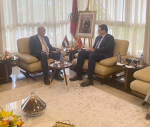You are here
Executive power, Brotherhood and Zamzam
Jan 17,2014 - Last updated at Jan 17,2014
The crisis between the originators of the Zamzam initiative in Jordan and the Muslim Brotherhood is the result of the breaking up of relations between the executive power, the Muslim Brotherhood and Zamzam.
This relationship gives the three parties two options: either work and remain together despite the widening gap amongst them or make a strategic review of that relation and its initial narration.
The Muslim Brotherhood and Zamzam — which was launched in 2012 by moderates from within the ranks of the Brotherhood and other activists — are like Siamese twins who desire to get separated but cannot unless they undergo a complicated surgery.
For the Muslim Brotherhood, the executive power is an essential social and political requirement, despite the differences that exist between them.
The Brotherhood is made up mainly of citizens of Palestinian origin; it shows its capability to mobilise and guide large masses of people, in certain political and social situations, to the aid of the government, and that was obvious particularly during the “Arab Spring”.
The Brotherhood managed to keep the majority of the Palestinian street neutral vis-à-vis the reform movement, precluding it from putting pressure on the government to achieve the social and political changes that the reform movement asks for, which requires confronting corruption, equal opportunities, and reorganising and managing public resources fairly, away from the domination of elites that were emerging and accumulating wealth for more than 90 years since the country was established.
Consequently, the social reform movement was deprived of a large public participation.
The Brotherhood, along with the professional associations, limited their role to leading opposition to the Jordanian-Israeli peace treaty, as well as to celebrating historical and religious events. Moreover, the Brotherhood came up with more historical occasions to celebrate that one would have thought of.
In the absence of the Brotherhood, the government will find itself facing demands of reform from new social basis, be they professionals who form the backbone of the middle class or population centres inhabited mainly by Jordanians of Palestinian origin.
The Brotherhood has shown ability to accommodate, adjust and direct the professional associations and the vast majority of citizens of Palestinian origin, thus offering a great gift to the executive power. The authorities are aware that neither they nor any substitute political or social current is capable of carrying out such a role.
Thus, in return, the executive power turns a blind eye to the Brotherhood’s programmes and activities, allowing it to work, infiltrate and influence popular residential areas and professional associations.
This relationship between government and Brotherhood is one of mutual necessity, rather than any other consideration.
In its ambiguous attitude that bridged the religious and social divide, the Muslim Brotherhood’s leadership and a majority of its members needed a national front to provide it with social protection and to act as a link between it and the executive authority, on the one hand, and the Jordanian society, on the other.
A moderate current of mostly East Bank Jordanians within the Muslim Brotherhood has been providing that role, acting as a safety valve that ensures moderation.
Furthermore, it has represented an assurance to the authorities that this current works as a counterbalance to the Brotherhood’s slipping into extremism and/or violence.
This national moderate current needs a public basis, with its voting power, due to the fact that it is made up of the elite and its leaders have limited influence on the social and professional milieu. It was offered this clout by the Brotherhood, with its history, Islamic and popular influence, confidence and legitimacy that it offers its members.
In case Zamzam splits from the Brotherhood, the latter would appear as a religiously rigid, politically isolated Palestinian group, while the former would appear as a moderate elitist Jordanian initiative with no coherent, broad social basis.
Today, this narrative appears to be revised or rewritten. The triangle of power looks as if it is in need of a separation operation regardless of the pain involved.
The Arab Spring placed the government in the face of a new equation, as it presented new needs that require to be met. Mainly, it needs to maintain its relationship with the governorates and local communities that for a long time seemed to constitute a social base for the authorities, but during the Arab Spring showed otherwise.
The government now needs social and Islamic leaderships that can restore the warmth and understanding between state and society.
The government has to realise that religious extremism exists within the ranks of some of its officials and establishments, and is not exclusively a trait of religious groups.
Such extremism can be found in schools, mosques and official religious organisations. Some government officials and political supporters of the authorities are more extremists than the Brotherhood’s members.
There is a pressing need to reorganise and redirect religious education, behaviour and tendencies at mosques, Sharia courts and the general public.
The government will not be able to do so without the help and support of moderate Islamists, and Zamzam initiative is the best to undertake such endeavour.
The writer is an Islamic scholar and thinker. He contributed this article to The Jordan Times.












